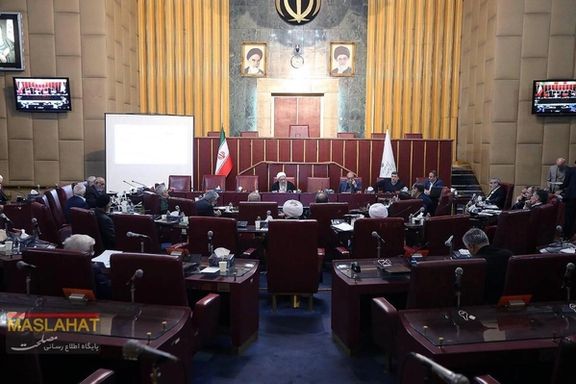The Expediency Discernment Council (EDC), reportedly authorized by Ali Khamenei to undertake this review, was created to resolve disputes between the parliament and the Guardian Council, the body responsible for granting final approval to all legislation.
Economy Minister Naser Hemmati recently announced on social media that the Supreme Leader has approved a revisiting of Iran's accession to anti-money laundering and terrorism financing conventions.
Khamenei has not made any public statements on the matter so far.
The Financial Action Task Force (FATF) is an intergovernmental organization established to combat money laundering, terrorist financing, and other threats to the international financial system. Iran was first placed on its blacklist primarily due to its failure to meet international standards for combating money laundering and terrorist financing.
Many observers believe that the rapid deterioration of the Iranian economy, coupled with demands by the presidential administration and many politicians in Tehran, may have led Khamenei to give the green light for resolving the matter.
In an interview published by Euro News on Tuesday and widely covered by Iranian media, Asghar Fakhrieh-Kashan, former deputy of Iran's Central Bank, expressed that he had "the feeling" President Masoud Pezeshkian had reached an agreement with Khamenei to resolve the issue.
What role does the Expediency Discernment Council play in the debate?
One of the Council’s main mandates is to arbitrate between the Parliament and the constitutional watchdog, the Guardian Council, when a law is approved by the former but rejected by the latter and they cannot resolve the dispute.
The Council’s chair and members are appointed by Khamenei.
The current controversy centers on two pieces of legislation required by the FATF to remove Iran from its blacklist: the Palermo Convention on combating transnational organized crime and the CFT Act on combating the financing of terrorism.
Although Parliament approved these laws in 2018, the Guardian Council rejected them, citing conflicts with "resistance economy guidelines," national security policies, and "contradiction with the Sharia".
In November 2018, the matter was referred to the EDC, where it has remained stalled. This prolonged inaction could not have occurred without Khamenei's directive or consent.
Approval by two-thirds of the EDC's 43 current members is needed to finalize the two long-delayed pieces of legislation.
Who supports and opposes FATF-required accession?
Accession to the conventions has been a contentious issue in the Iranian political scene since 2016, largely due to the significant restrictions Iran faces on its relations with international banks and foreign trade as a result of being on the FATF blacklist.
Pezeshkian repeatedly called for accession to the FATF’s conventions during his campaign as a crucial move to prevent the country’s financial isolation. His government says a final resolution of the matter may be near.
The former nuclear negotiator, hardliner Saeed Jalili, who ran against Pezeshkian in the July snap presidential elections, is currently a member of the Expediency Discernment Council (EDC). He has the support of EDC members and some lawmakers in Parliament.
In a fiery anti-American speech recently, ultra-hardliner lawmaker Mehdi Koochakzadeh slammed the efforts to accede to anti-money laundering conventions under the Financial Action Task Force (FATF) as tantamount to “approving servitude to America.”
In a letter earlier this week to the Chairman of the Expediency Discernment Council (EDC), Sadegh Amoli-Larijani, 120 lawmakers argued that accession to the Palermo and CFT conventions would not benefit the Iranian nation. They contended that such a move would only “escalate the problems resulting from sanctions” and enable the US to uncover Iran's methods of circumventing them.
Reports suggest that at least half the members of EDC have a history of opposing not only these laws but Iran's accession to all conventions demanded by FATF.
However, as in many other cases, a subtle indication through unofficial channels from Khamenei may turn some of them.
Why is a decision on FATF legislation important?
The FATF recommends "enhanced due diligence" for transactions involving blacklisted countries. This makes financial dealings with Iran costly, risky, and time-consuming for international institutions. Countries may also apply countermeasures, such as terminating banking relationships, prohibiting transactions, or imposing additional audit requirements.
Resolving FATF-related issues would reduce these barriers, potentially facilitating greater access to international financial markets and alleviating economic pressure on Iran.
What steps has Iran taken to meet FATF’s requirements?
In 2016, under President Hassan Rouhani, Iran agreed to an FATF action plan to move from the blacklist to the gray list.
By 2020, however, the FATF reinstated Iran on its blacklist due to its failure to complete the action plan.
The global anti-money laundering task force, therefore, urged its members to continue to advise their financial institutions to apply enhanced due diligence to business relationships and transactions with natural and legal persons from Iran.
37 of the 41 recommendations to the Iranian government that the FATF made in 2016, including a cash declaration regime, were accepted by Iran and relevant legislation was introduced in these areas. But the counter-terrorism financing remains the toughest hurdle in Iran as hardliners argue that it would restrict Iran’s ability to assist their proxy groups abroad.









